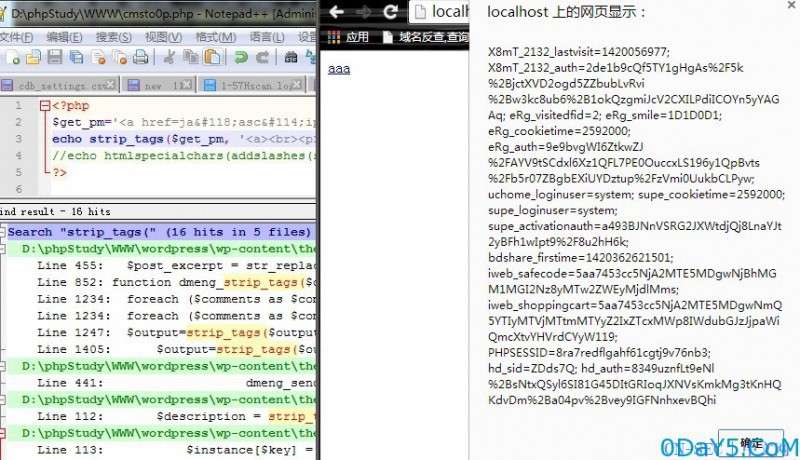由于某编辑辛苦弄了一套主题。然后被某墨盒测试出来一个XSS漏洞。然后就丢给我。让我看看这个漏洞能不能修复。
首先找到问题所在,是在发送私信的地方存在对参数每一过滤好造成的。读取的时候也是没有处理。直接给打印出来了。
首先找到问题所在文件
themes/dmeng2.0/author.php 86行左右
//~ 私信start $get_pm = isset($_POST['pm']) ? trim($_POST['pm']) : ''; //获取传递来的pm赋值给$get_pm if( isset($_POST['pmNonce']) && $get_pm && is_user_logged_in() ){ //检测验证码,是否登录,以及PM是否存在 if ( ! wp_verify_nonce( $_POST['pmNonce'], 'pm-nonce' ) ) { $message = __('安全认证失败,请重试!','dmeng'); }else{ $pm_title = json_encode(array( 'pm' => $curauth->ID, 'from' => $current_user->ID )); if( add_dmeng_message( $curauth->ID, 'unrepm', '', $pm_title, $get_pm ) ){ //直接发送$get_pm //~ 发邮件通知 if(is_email($curauth->dmeng_verify_email)){ $m_headline = sprintf(__('%1$s给你发来了私信','dmeng'), $current_user->display_name); $m_content = '<h3>'.sprintf( __('%1$s,你好!','dmeng'), $curauth->display_name ).'</h3><p>'.sprintf( __('%1$s给你发来了<a href="%2$s" target="_blank">私信</a>,快去看看吧:<br> %3$s','dmeng'), $current_user->display_name, htmlspecialchars( add_query_arg('tab', 'message', get_author_posts_url( $curauth->ID )) ), $get_pm).'</p>'; //直接显示$get_pm dmeng_send_email( $curauth->dmeng_verify_email, $m_headline, $m_content ); } $message = __('发送成功!','dmeng'); } } }
可以看出来$get_pm在整个流程中并没有被转码或者其他的操作。直接带入数据库并显示出来了。所以,发信的内容为我们精心构造的XSS代码。就再你查看私信的时候就触发了。如果发信给管理员呢..
我们继续看下add_dmeng_message函数
在文件dmeng2.0/inc/message.php
function add_dmeng_message( $uid=0, $type='', $date='', $title='', $content='' ){ $uid = intval($uid); $title = sanitize_text_field($title); if( !$uid || empty($title) ) return; $type = $type ? sanitize_text_field($type) : 'unread'; $date = $date ? $date : current_time('mysql'); $content = htmlspecialchars($content); //对content进行了htmlspecialchars处理。不过后面却使用了htmlspecialchars进行了还原。 global $wpdb; $table_name = $wpdb->prefix . 'dmeng_message'; if($wpdb->query( "INSERT INTO $table_name (user_id,msg_type,msg_date,msg_title,msg_content) VALUES ('$uid', '$type', '$date', '$title', '$content')" )) return 1; return 0; }
在后台也有一个显示的
if($tab=='repm'){ $table_name = $wpdb->prefix . 'dmeng_message'; $sql_where = "FROM $table_name WHERE msg_type='repm' OR msg_type='unrepm'"; $count = $wpdb->get_var( "SELECT count(msg_id) ".$sql_where ); $messages = $wpdb->get_results( "SELECT user_id,msg_date,msg_title,msg_content ".$sql_where." ORDER BY msg_id DESC LIMIT $offset,$limit" ); if( $messages ){ $output = ''; foreach( $messages as $message ){ $repm = json_decode($message->msg_title); $output .= '<p>'.sprintf( __('%1$s %2$s 给 %3$s 发私信:%4$s', 'dmeng'), $message->msg_date, '<a href="'.dmeng_get_user_url('message', $repm->from).'" target="_blank">'.get_the_author_meta('display_name', $repm->from).'</a>', '<a href="'.dmeng_get_user_url('message', $repm->pm).'" target="_blank">'.get_the_author_meta('display_name', $repm->pm).'</a>', htmlspecialchars_decode($message->msg_content)). //这里的呢~恩。入库使用的是htmlspecialchars,这里还原了。不是啥都没有做嘛~ '</p>'; } } }
后来看到作者在群里面说修改的脚本
97行
if( add_dmeng_message( $curauth->ID, 'unrepm', '', $pm_title, strip_tags($get_pm, '<a><br><p>') ) ){
自己本地测试了下
<?php $get_pm='<a href=javascript:alert(document.cookie)>aaa</a>'; echo strip_tags($get_pm, '<a><br><p>'); ?>

针对作者自己写的过滤,小小的突破了下。本地测试效果还是不错的
感觉这样的修复,实在是。简单的写了一个过滤$get_pm = htmlspecialchars(addslashes(stripSlashes($get_pm)));
//~ 私信start $get_pm = isset($_POST['pm']) ? trim($_POST['pm']) : ''; //获取传递来的pm赋值给$get_pm $get_pm = htmlspecialchars(addslashes(stripSlashes($get_pm))); //对$get_pm在进入数据之前进行处理 if( isset($_POST['pmNonce']) && $get_pm && is_user_logged_in() ){ //检测验证码,是否登录,以及PM是否存在 if ( ! wp_verify_nonce( $_POST['pmNonce'], 'pm-nonce' ) ) { $message = __('安全认证失败,请重试!','dmeng'); }else{ $pm_title = json_encode(array( 'pm' => $curauth->ID, 'from' => $current_user->ID )); if( add_dmeng_message( $curauth->ID, 'unrepm', '', $pm_title, $get_pm ) ){ //直接发送$get_pm //~ 发邮件通知 if(is_email($curauth->dmeng_verify_email)){ $m_headline = sprintf(__('%1$s给你发来了私信','dmeng'), $current_user->display_name); $m_content = '<h3>'.sprintf( __('%1$s,你好!','dmeng'), $curauth->display_name ).'</h3><p>'.sprintf( __('%1$s给你发来了<a href="%2$s" target="_blank">私信</a>,快去看看吧:<br> %3$s','dmeng'), $current_user->display_name, htmlspecialchars( add_query_arg('tab', 'message', get_author_posts_url( $curauth->ID )) ), $get_pm).'</p>'; //直接显示$get_pm dmeng_send_email( $curauth->dmeng_verify_email, $m_headline, $m_content ); } $message = __('发送成功!','dmeng'); } } }
这里的过滤呐。还是不变化吧
if($tab=='repm'){ $table_name = $wpdb->prefix . 'dmeng_message'; $sql_where = "FROM $table_name WHERE msg_type='repm' OR msg_type='unrepm'"; $count = $wpdb->get_var( "SELECT count(msg_id) ".$sql_where ); $messages = $wpdb->get_results( "SELECT user_id,msg_date,msg_title,msg_content ".$sql_where." ORDER BY msg_id DESC LIMIT $offset,$limit" ); if( $messages ){ $output = ''; foreach( $messages as $message ){ $repm = json_decode($message->msg_title); $output .= '<p>'.sprintf( __('%1$s %2$s 给 %3$s 发私信:%4$s', 'dmeng'), $message->msg_date, '<a href="'.dmeng_get_user_url('message', $repm->from).'" target="_blank">'.get_the_author_meta('display_name', $repm->from).'</a>', '<a href="'.dmeng_get_user_url('message', $repm->pm).'" target="_blank">'.get_the_author_meta('display_name', $repm->pm).'</a>', htmlspecialchars(addslashes(stripSlashes(htmlspecialchars_decode($message->msg_content)))). //这里的呢~恩。入库使用的是htmlspecialchars,这里还原了。不是啥都没有做嘛~于是继续给他xxx '</p>'; } } }
最新号外:后来作者使用了wp自带的过滤函数wp_strip_all_tags来过滤了。详情关注
wp-includes/formatting.php
function wp_strip_all_tags($string, $remove_breaks = false) { $string = preg_replace( '@<(script|style)[^>]*?>.*?<///1>@si', '', $string ); $string = strip_tags($string); if ( $remove_breaks ) $string = preg_replace('/[/r/n/t ]+/', ' ', $string); return trim( $string ); }
因此,当然,我个人比较喜欢记录出来全部的东西。这里是采用了替换的方式。个人喜好不一样而已。这里告一个段落...
免责声明:文章中涉及的程序(方法)可能带有攻击性,仅供安全研究与教学之用,读者将其信息做其他用途,由读者承担全部法律及连带责任,本站不承担任何法律及连带责任;如有问题可邮件联系(建议使用企业邮箱或有效邮箱,避免邮件被拦截,联系方式见首页),望知悉。
- 左青龙
- 微信扫一扫
-

- 右白虎
- 微信扫一扫
-





评论